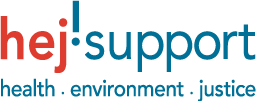
Global sound management of chemicals and waste: outcomes of the virtual group discussion and way forward
BlogOn March 25th 2021, HEJSupport hosted a webinar on the matter of the future of the Strategic Approach to International Chemicals Management (SAICM)[1].
Speakers included:
Mr. David Morin, Co-Chair of the Beyond 2020 Intersessional Process; and
Ms. Nalini Sharma, representing the Secretariat of the Strategic Approach to International Chemicals Management (SAICM).
The discussion was moderated by Olga Speranskaya and Alexandra Caterbow, HEJSupport Co-directors.
While welcoming everyone to the discussion, Olga Speranskaya noted that SAICM is a unique instrument that covered chemicals not covered by any other agreement; it is a multistakeholder and mulstisectorial strategy that is linked to health, environment and sustainable development. However, because SAICM mandate is supposed to end in 2020, since 2017 and even before since 2015 most attention has been focused on the development of a new global platform on sound chemicals and waste managementbeyond 2020. An Intersessional Process (IP) was set up to start developing the recommendations regarding the Strategic Approach and the sound management of chemicals and waste beyond 2020.
First David Morin gave an overview of the Intersessional Process and spoke about the work and procedures of SAICM, especially the Intersessional Process, its goals and the outcomes so far. He also explained the decision to postpone the face to face fourth meeting of the Intersessional Process (IP4) and the fifth session of the International Conference on Chemicals Management (ICCM5) due to the worldwide situation regarding the pandemic.
In addition, David Morin noted that four Virtual Working Groups (VWGs) were set up last year to support the work of the intersessional process to advance its discussions and support continued progress. While noting the importance of the virtual working groups as an opportunity to enhance understanding and advance dialogue on a few specific, issues, he also underlined that the virtual working groups were not intended to replace formal face-to-face discussions of IP4 or the negotiations at ICCM5. In addition, David Morin emphasized that the virtual working groups were open to allwho wish to participate. Two models of work, virtual meetings and written input, were applied to meet the need for equitable representation, transparency and inclusiveness. He, nevertheless, mentioned a few challenges faced by the participants in the virtual working groups, including poor virtual technology connectivity, differences in time zones, language barrier, time constraints for delegations to consider proposals and provide input on working documents, and uneven regional representation. He also mentioned that evaluation of the VWG process to be undertaken to inform decisions on process going forward.
Moving on, David Morin gave the overview of the next steps that include the continuation of the implementation of activities on the Sound Management of Chemicals and waste under SAICM from now till the time when face-to- face- meetings become possible; as well as the decision to finalize the mandate of the Intersessional Process regarding the development of recommendations for future sound chemicals and waste management arrangements.
Ms. Nalini Sharma provided an overview of the Co-facilitators reports on the outcomes of work of the virtual working groups that took place between late October 2020 and early February 2021. She shared statistics on the number of different stakeholders that participated in the VWGs. She noted that the majority of the participants in each VWG represented non-governmental organisations while government representatives were mostly from EU-JUSCANNZ region with a minority of governments from developing countries and countries with economies in transition.
In addition, a short summary of the recommendations on further work was presented based on the reports from the VWG co-facilitators.
VWG 1 on targets, indicators and milestones
The group has developed a document of possible formulations of targets based on views expressed by stakeholders during the virtual meetings and in the written submissions, including new targets for which the formulations gained overall support.
The co-facilitators have noted that more work needs to be done before IP4 and/or ICCM5 on targets, indicators and milestones and put out two options for consideration in their report. The ICCM5 Bureau will be making the final decision on how this work moves forward. Options for further work include:
Option 1) proposes a continuation of work on targets, indicators and milestones by a policy expert group, similar in nature to the current VWG on targets.
Option 2) combines work of a policy expert group with work by a subgroup more technical in nature, which would that would undertake specific work on indicators. UNEP, along with other International Organizations, including members of the IOMC, have expressed their support to take the lead in the indicators part of the work.
The Co-facilitators’ report can be downloaded here.
VWG 2 on Governance and mechanisms to support implementation
The group drafted recommendations for the following sections:
Section B on national implementation;
Section C on regional, and sectoral cooperation and coordination;
Section D on Enhanced Sectoral and Stakeholder Engagement;
Section E on subsidiary and ad hoc Expert Bodies;
Section G on taking stock of progress; and
Section H on mechanism for updating and revising the framework.
The group also developed recommendations for the establishment of a Science-Policy Interface (SPI) including the following points for future discussions:
•There is a confirmed need for some form of a SPI.
•Any SPI mechanism designed to meet this need should be inclusive of all relevant stakeholders and sectors, encouraging new channels to spur the involvement of academics, industry, scientists, NGOs, labor, health, and other civil society representatives.
•Any SPI should be mindful of the need to ensure expertise from developing countries and indigenous communities and to take into account local knowledge and gender considerations.
•The SPI should not be policy prescriptive.
•Provide clarity to ensure that the work of any SPI would not be duplicative of existing efforts, including efforts under the scientific bodies of existing multilateral environmental agreements
The Co-facilitators’ report can be downloaded here.
VWG3 on Issues of concern
Following discussions in the VWG and building on the compilation document, the co-facilitators set out proposed text on the future process for Issues of Concern for future discussions in the intersessional process. In addition, the group discussed the path forward for the existing SAICM emerging policy issues and other issues of concern to be discussed at ICCM5.
The co-facilitators further recommended that the ICCM5 Bureau consider inviting:
a. the lead agencies of the IOMC, Governments and other relevant stakeholders to report to ICCM5 on progress in the implementation of emerging policy issues and other issues of concern.
b. the responsible IOMC organizations, in consultation with stakeholders, to propose a draft work plan or a road map that outlines the immediate priorities and the rationale to continue to address the issue under the new instrument, including: (a) an assessment on how they contribute to achieving the Strategic Objective(s) and Targets of the new instrument; and (b) proposing additional indicators as needed for relevant targets.
The Co-facilitators’ report can be downloaded here.
VWG4 on financial considerations
The co-facilitators propose to the ICCM5 Bureau that a new virtual process is established to continue the discussions on financial considerations, while a decision is taken on the organization of IP-4 and ICCM5. A new process would allow to further deliberate on:
- The proposals on strengthening the private-sector involvement presented by stakeholders: the capacity building clearing house mechanism (ICCA); a global coordinated tax or fee on the chemical industry (CIEL/IPEN); the establishment of a financial contribution of 0.5% of industry’s annual turnover (Africa Group).
- Dedicated external financing for the implementation of the new beyond 2020 instrument (Colombia).
- Alternative text proposals prepared based on the written submissions and views presented at the VWG meetings.
The Co-facilitators’ report can be downloaded here.
Summing up, Olga Speranskaya noted that many NGO representatives took part in the Virtual Working Groups by providing comments to the documents as well as by participating in the virtual meetings. They not only shared their personal opinion but also ensured that NGO comments reflected the opinion of other NGO groups not present at the meetings which made NGO feedback even more valuable.
She concluded that the SAICM Secretariat and the SAICM Bureau prepared a draft scenario for moving forward. The scenario inter alia includes:
- administrative decisions on the continuation of SAICM, its work programme and budget which are supposed to be taken using the silence procedure;
- administrative decisions on a continuation of the Intersessional preparatory process to confirm that the ICCM4 IP-mandate is continued until ICCM5 can formally convene. This means the development of recommendations for future SMCW arrangements for consideration at ICCM5.
In the draft scenario from SAICM Secretariat it is noted that practical preparation for the adoption of these administrative decisions through a silence procedure would require a preparation of:
1) A biennial work programme (including ongoing and/or new SAICM work, any provisions for extending the work of the Intersessional Process) and
2) An associated budget for the secretariat (including financial provisions and a broad timeframe for the continuation of the Intersessional Process).
A group of NGOs prepared a response to this scenario that was sent to SAICM Secretariat on March 23 in which NGOs noted that the stakeholders should use the time between now and the face-to-face meetings to address gaps identified in the Global Chemical Outlook and the UNEP assessment report of Issues of Concern towards achieving the 2020 goal and contribute to the 2030 Agenda. They emphasized that the suggested biennial work programme should clearly underline steps towards achieving meaningful prevention and reduction of toxic chemicals use, emissions, waste generation, and contamination of people and the environment. They also suggested that the evaluation of the implementation of this biennial programme should be conducted prior to face-to-face meetings to identify the remaining gaps.
Discussion
The floor was then opened for participants to ask their questions to the panelists, as well as give their opinions on different areas. The following questions were considered:
- What should SAICM stakeholders focus on from now until face-to-face meetings can formally convene?
- How to increase NGO engagement in the Beyond 2020 process?
- What priority areas should be addressed under the beyond 2020 framework?
- The main topics under discussion were how broad should the new SAICM mandate be. As was noted by one of the participants, we are using the resources of 1.7 Earth. Chemical production is projected to double in a next 20 years, and pollution is already very pervasive. If the planet has limits to what it has already provided, then the requirement to sustainability is a very real issue. We need to look at the context of how we live, where we live, and what we do. SAICM plays a big role in this by developing approaches to the sound management of chemicals and waste, by bringing people together in different technical working groups to brainstorm on the ways to addresses the issue of pollution. Due to the pandemic situation, the virtual working groups were brought together to keep the momentum going and get everyone ready for in personal meetings where these topics will be further advanced and policy directions will be set up together by governments, industry, NGO community, and UN organizations. This work should be guided by the science and evidence of pollution caused by chemicals and waste that we all see.
During the discussion it was noted that the virtual working groups will consider a set of criteria for information to demonstrate if new issues of concern under SAICM are of global nature. And one of the criteria that will be considered is what the current science is on this issue. There will be time for sharing this information among different stakeholders to see if there is a support of this issue to be nominated. Then there will be a prioritization exercise and the issue will be taken to the international conference setting for the final decision regarding the nomination. Thus, there will be a process in order to come up with the selection of particular issues of concern that will go forward, and science will be very much considered.
There is also a proposal for setting up a science committee that will support reviewing the nominations received from stakeholders. This will help to ensure that the sustainability is part of the discussions and the final decision making.
- A question was raised regarding the enabling framework which is an essential element of making a holistic governance for achieving a more efficient future chemicals and waste agreement. It will also help to raise the political profile of chemicals and waste at the international agenda. The idea of an enabling framework was first presented in the CoChairs’ Paper on the Strategic Approach to International Chemicals Management and the sound management of chemicals and waste beyond 2020 at SAICM Open Ended Working Group in 2019. The NGO position regarding the enabling framework was presented in the form of an infographic. NGOs propose that the future framework should include all chemicals-related multilateral agreements under one high-level umbrella, respecting the legal autonomy of each agreement and allowing for the possibility of future legally binding agreements on issues of concern[2]. The language of the enabling framework should allow for the possibility of future legally binding agreements on issues of concern[3].
What happened to this discussion that was very advanced during the last face to face Intersessional Meeting in 2019? Wouldn’t it be logical to make it part of the Virtual Working group on Governance? While discussing these questions, it was noted that the topic of an enabling framework is more for the negotiations rather than for the discussions within the virtual working groups. It was explained that the discussion within the virtual groups was more on technical issues that need to be advanced while topics for the negotiations are postponed till face-to-face meetings become possible.
3. A participant highlighted the importance to hear about the role NGOs played in the work of the Virtual Working Groups. The level of NGO engagement and dedication to the process is very much appreciated. Such webinars are a good opportunity to reflect back on how this engagement looked like at the earlier stages of SAICM negotiations as a policy framework. NGOs were quite present at those negotiations. A good way to support and increase it moving forward is to ensure that the priorities that will be set are also linked to the priorities identified at the national level. It was noted that the SAICM process is very open, and stakeholders could be engaged through national processes on chemicals and waste or through NGOs, including international NGOs. At the national levels there are various SAICM related meetings where countries develop positions and priorities for moving forward and where NGOs could be actively involved.
4. Some participants thought that SAICM should consider more broadly the circular aspect of chemicals management. Others thought, it would be pertinent to integrate the “essentiality” principle. An example of Endocrine Disrupting Chemicals was provided: do we really need these chemicals or could we do without. Along with essentiality, there is a durability issue versus being thrown away as a single-use. This is very much in line with the idea that we are exploiting the Earth much quicker than it is being regenerated.
The discussion was further moved to the link between the “essential” and “trivial“ use giving the example of triclosan chemical that was originally used as a disinfector but then added to shampoo and other consumer products. This resulted in significant contamination of water courses creating huge costs for water systems and taxpayers. The discussion was further moved to the idea that a tax should be put on each chemical that has the beginnings of evidence of harm, to reflect the external cost into the market price. The revenue should further be used to fund more sustainable alternatives. The tax should be raised as the evidence about the hazardous substance increases.
One more principle discussed was about persistence and spatial range which is hazardous and costly and includes legacy chemicals. It is important to highlight this and talk about the ability of hazardous substances to persist and have a large spatial range.
5. An issue of a cross-cutting character of chemicals and waste was discussed. Chemicals have effects on climate, biodiversity, circularity. To address this a better connection between different legislations and processes is needed. The cross-cutting character of chemicals and waste was noted in the draft high-level declaration that is being developed by a small working group and that will be part of the new framework beyond 2020.
6. A question was raised whether mining of chemicals is part of the discussion on issues of concern. It was explained that the discussions within the Virtual Working Groups were inter alia focused on the identification of whether an issue is of international/global or national concern. If an issue is affecting multiple regions across the globe, then it would be considered as a potential issue of concern that could be nominated under the new framework on chemicals and waste. Thus, it is important that NGOs play an active role in the discussions on the criteria for issues of concern to ensure that all aspects are well covered, including environmental and social aspects as well as cross-cutting nature of chemicals and waste. It was noted that in the future the issues of concern that will be considered will not be based on a chemical-by-chemical approach but rather on a circular economy approach and different chemical types.
7. The importance of a general agreement to move the existing issues of concern under the new instrument on sound chemicals and waste management beyond 2020 was highlighted. These issues represent the problems of a global nature, including endocrine disruptors, persistent pharmaceutical pollutants, chemicals in products, hazardous chemicals in electronics. They need to have the attention of the international community to ensure they are addressed affectively and that a real risk reduction of toxic chemical exposure on human health and environment is achieved. For NGOs it is obvious that stakeholder responsibility regarding the implementation of issues of concern should be significantly elevated to ensure effective risk reduction. And this is what NGOs are expecting from the new instrument on sound chemicals and waste management.
8. A discussion was further directed to the voluntary nature of SAICM. It was noted that because SAICM is not a legally binding framework, the process of making changes in chemicals management to achieve better risk reduction and minimize harm is slow. What opportunity are there to integrate legally binding aspects into SAICM process beyond 2020? NGO vision of the beyond 2020 instrument include a combination of voluntary and legally binding approaches. Two years ago, a group of NGOs developed a set of criteria or triggers to evaluate an issue of concern against its work plan and assess the effectiveness of its implementation. Three case studies were developed, on chemicals in products, highly hazardous pesticides and PFAS, to show how these triggers could be applied. NGOs suggest that if an issue of concern has not been addressed adequately, then the work should be moved to a higher level of obligation on stakeholders. Different approaches to elevate obligations, including legally binding ones have been suggested that will help to address these issues more effectively.
9. The group also discussed the importance of the integration of occupational health into the discussion and schemes related to the sound management of chemicals and waste beyond 2020. Workers’ safety will be one of the key points in the draft High-level declaration that will be part of the new beyond 2020 framework on chemicals and waste. Workers’ voices are represented by trade unions in the Bureau of SAICM and were also very visible and well heard in the work of the Intersessional process and the Virtual Working Groups.
At last, participants also agreed that NGO engagement should be well ensured during the future SAICM related meetings and raised the question of making their participation in SAICM work more visible. The importance of NGOs participation in the Virtual Working Groups was noted if the decision is made to continue the work within these groups.
If the SAICM face-to- face meetings have been for now postponed, the issues raised during the webinar can make the virtual meetings more fruitful. The evolution and implementation of SAICM are essential to make an effective transition towards a sustainable and global management of chemicals.
The participants thanked the organizers of the meeting and noted that the webinar was of great need since the virtual working groups ended at the beginning of 2021.
[1] To learn more on SAICM : https://hej-support.org/saicm/ and try our On-line courses https://hej-support.org/new-course-on-saicm-issues-of-concern/
[2] Relevant agreements should include, but are not limited to, Basel, Rotterdam, Stockholm, and Minamata Conventions; SAICM;
FAO Code of Conduct; relevant ILO Conventions, and the International Health Regulations.
[3] SAICM Emerging Policy Issues and Issues of Concern include:
- Lead in paint
- Chemicals in products
- Hazardous substance within the life cycle of electrical and electronic products
- Nanotechnology and manufactured nanomaterials
- Endocrine-disrupting chemicals
- Environmentally persistent pharmaceutical pollutants
- Perfluorinated chemicals and the transition to safer alternatives
- Highly hazardous pesticides



